Learn how to make a versatile orange juice marinade that works for a variety of proteins. With just a handful of simple ingredients, you can transform chicken, pork, or shrimp into a sweet and tangy dish. Using fresh orange juice, ginger, and a hint of honey, this gluten-free marinade is quick to prepare and adds a citrusy twist to your next meal.
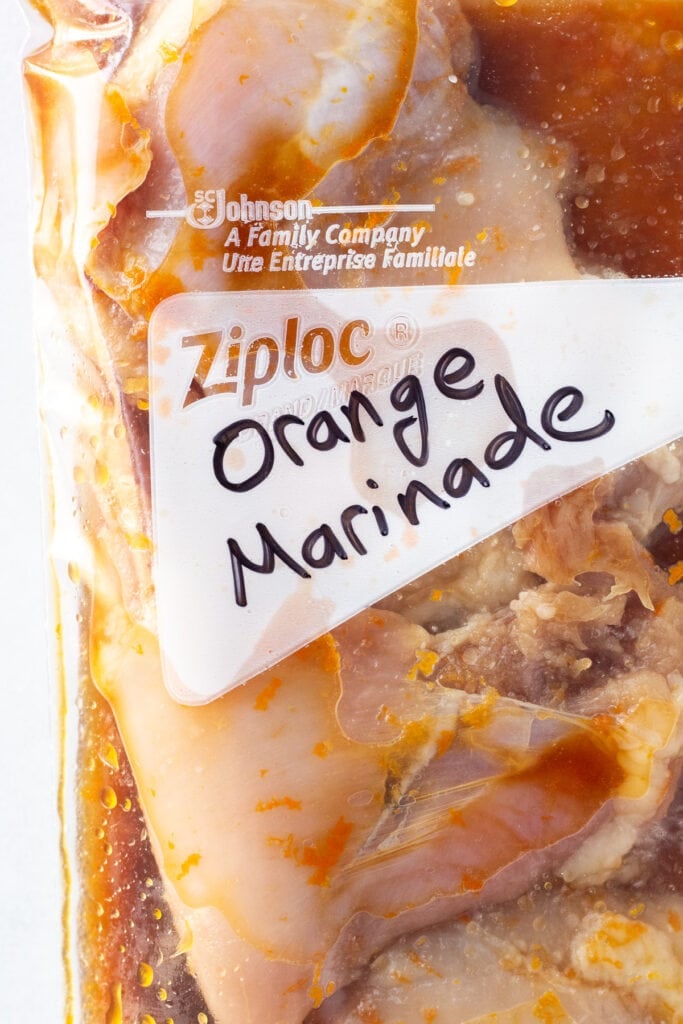
Do you ever try an orange dish and think “this does not have enough orange flavor“?
That’s not a problem with this marinade.
Not to toot my own horn but I know a thing or two about marinades – I’ve grilled marinated chicken thighs, marinated flank steak, and marinated shrimp, just to name a few.
Plus you’ll find a ton of gluten free marinades on this site.
So when making this orange marinade I leaned on both my experience and knowing I really wanted to orange flavor to come out.
Which is why this marinade uses both the orange juice and orange zest to pack a one-two punch of orange into your protein.
It also has a great sweet and salty vibe to it, from the soy sauce and the honey. Plus a little zing from the fresh ginger.
It’s a great marinade that can make your chicken, pork, or shrimp stand out.
Grab these ingredients
(Note: the full ingredients list, including measurements, is provided in the recipe card at the bottom of this post.)
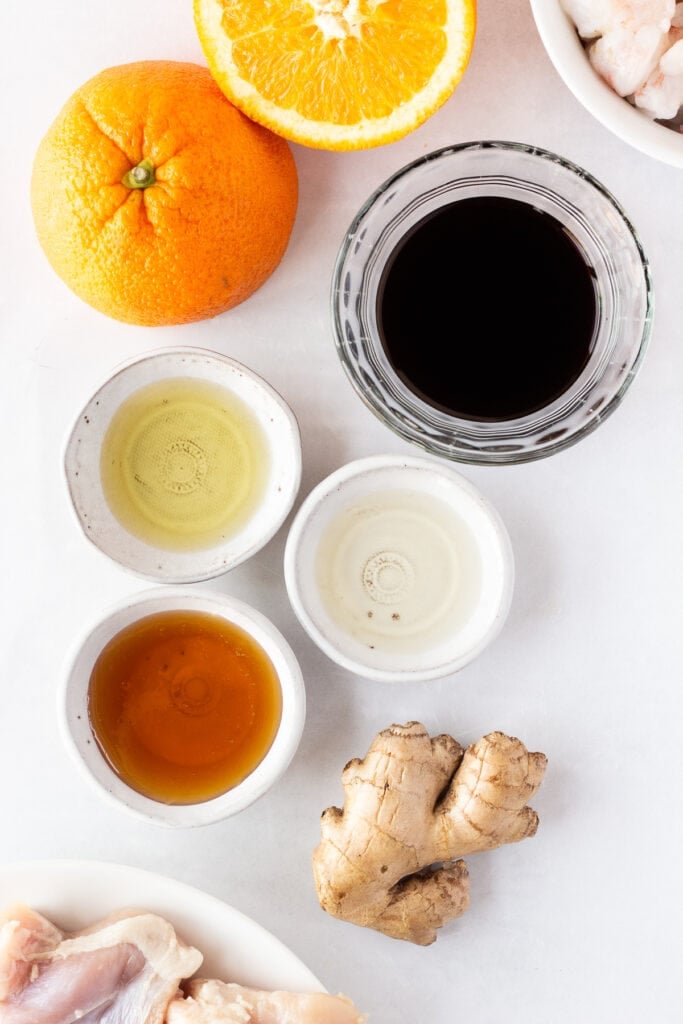
- Orange – I used a naval orange in this recipe, but you can also use a Cara Cara orange or other type if you like.
- Soy sauce (or tamari) – you can use regular soy sauce, or if you’re gluten free you can use tamari sauce or gluten free soy sauce. While the two are slightly different you can use them interchangeably in this recipe.
- Honey – don’t use your fancy honey here, just whatever comes from the grocery store will work. If your honey is particularly stiff you may want to warm it slightly in a microwave-safe dish before putting it in with the other marinade ingredients.
- Ginger – fresh grated ginger is going to give you better flavor, or you can use a premade ginger paste or minced ginger. I do not recommend using ground ginger.
- Rice vinegar – this should be available at most grocery stores in with items like soy sauce. If you can’t find it you can substitute apple cider vinegar in a 1:1 ratio.
- Oil – you want a mild oil for the marinade that won’t impact the flavor. My preference is avocado oil as it’s both mild and has a fairly high smoke point.
How to make an orange juice marinade for pork, chicken, & shrimp
(Note: please see the recipe card at the end of this post for the complete written instructions.)
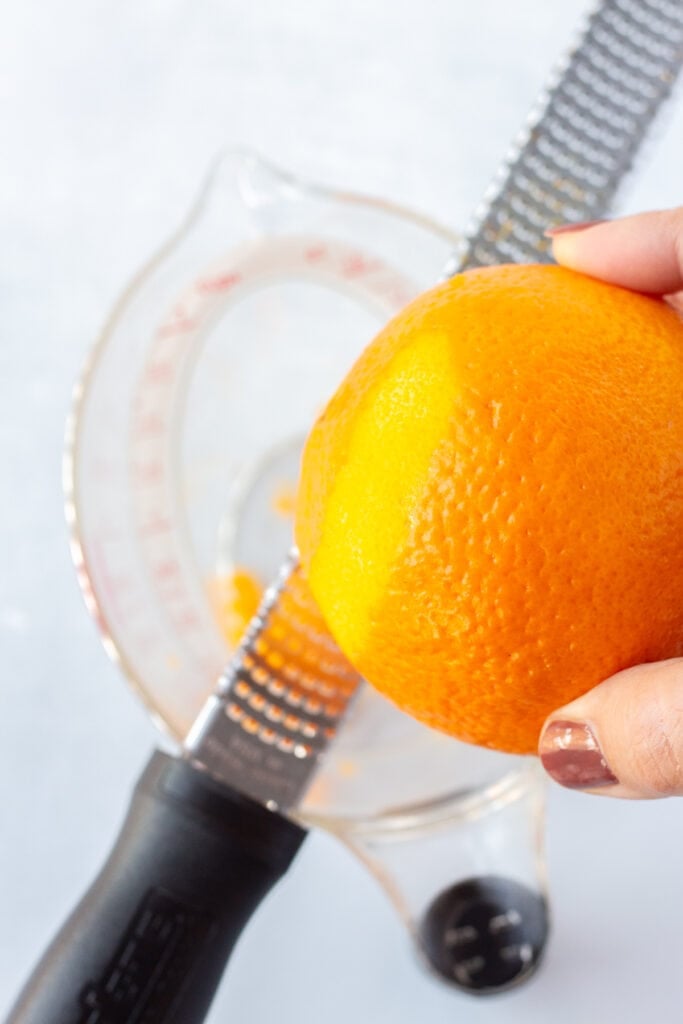
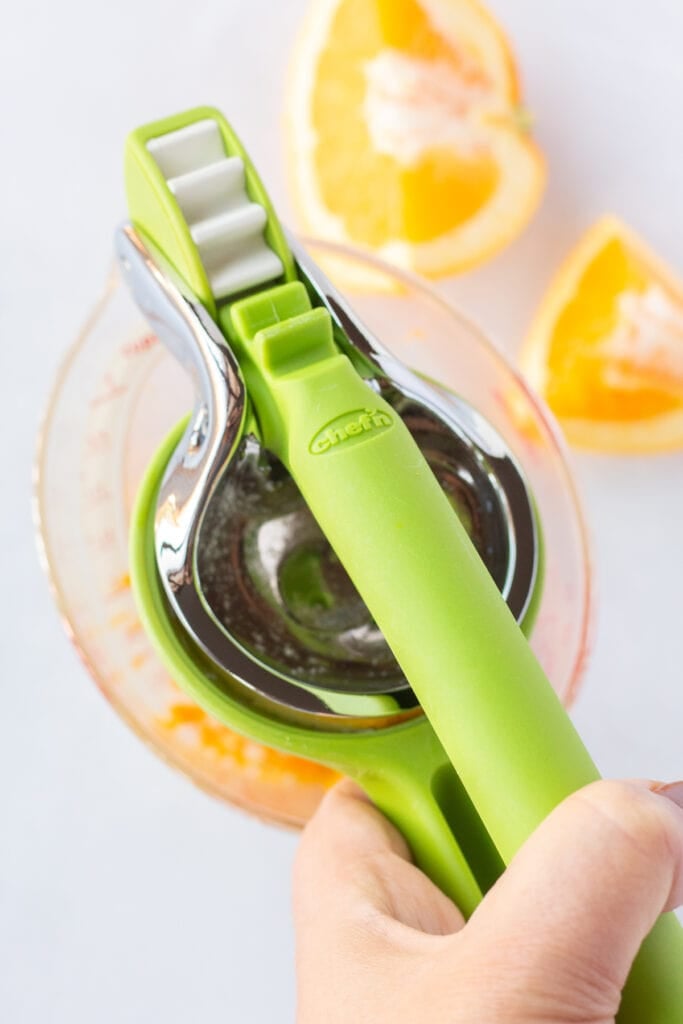
TIPS FOR ZESTING AN ORANGE
- Don’t cut the orange before you zest it. A full orange is going to be easier to handle than half an orange, and you won’t have to worry about juice squeezing out when you zest it.
- A microplane is going to give you the best results as it’s easiest to handle and has very small holes. If you don’t have a microplane, use the side of a box grater with the smallest holes.
- Rest the microplane on the rim of a medium to large bowl that’s on a flat surface. This will help stabilize microplane and make it easier to apply pressure on the orange.
- Start out pressing the orange very lightly onto the microplane so you only get the zest and not the pith (the whiteish part between the zest and the flesh). If you need to you can always go back over parts of the orange, but you can’t go back and pick pith out of parts you’ve already zested!
- Short movements are best when zesting. Since an orange is round, the longer your zesting movements the more adjustments you’ll have to make. This can lead to over-zesting and getting the pith in the zest. Do short swipes of the orange and rotate the orange slightly after every one or two swipes.
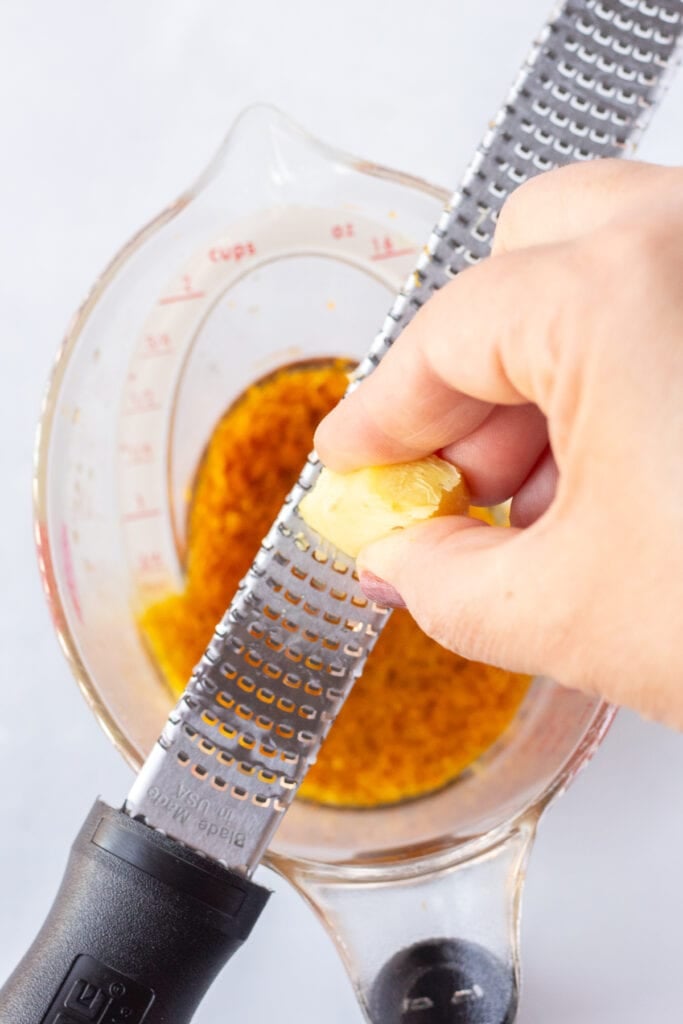
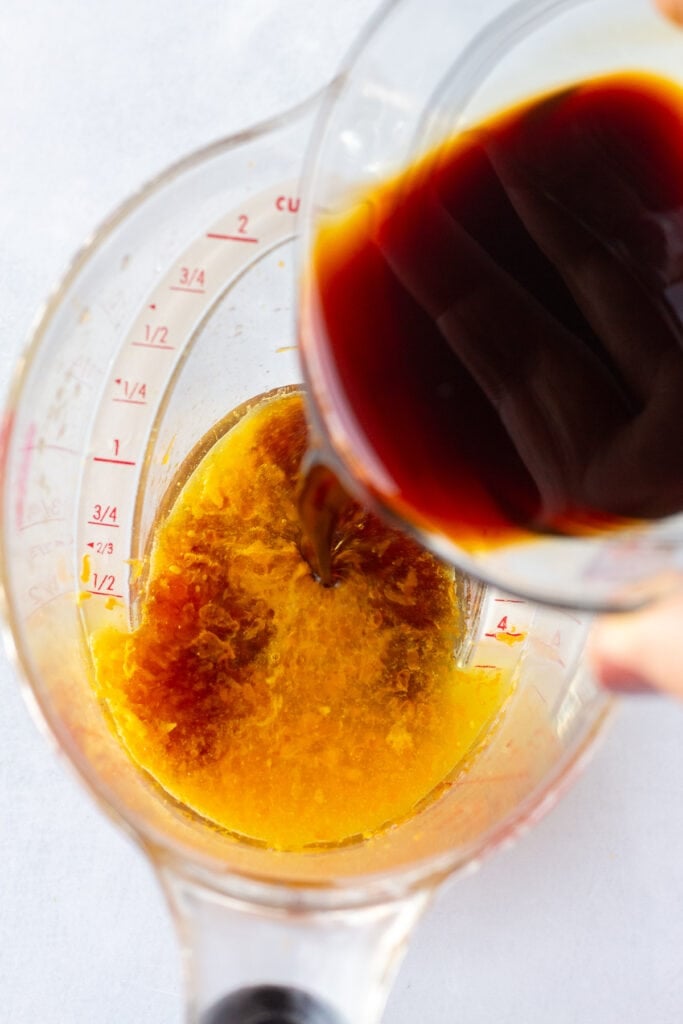
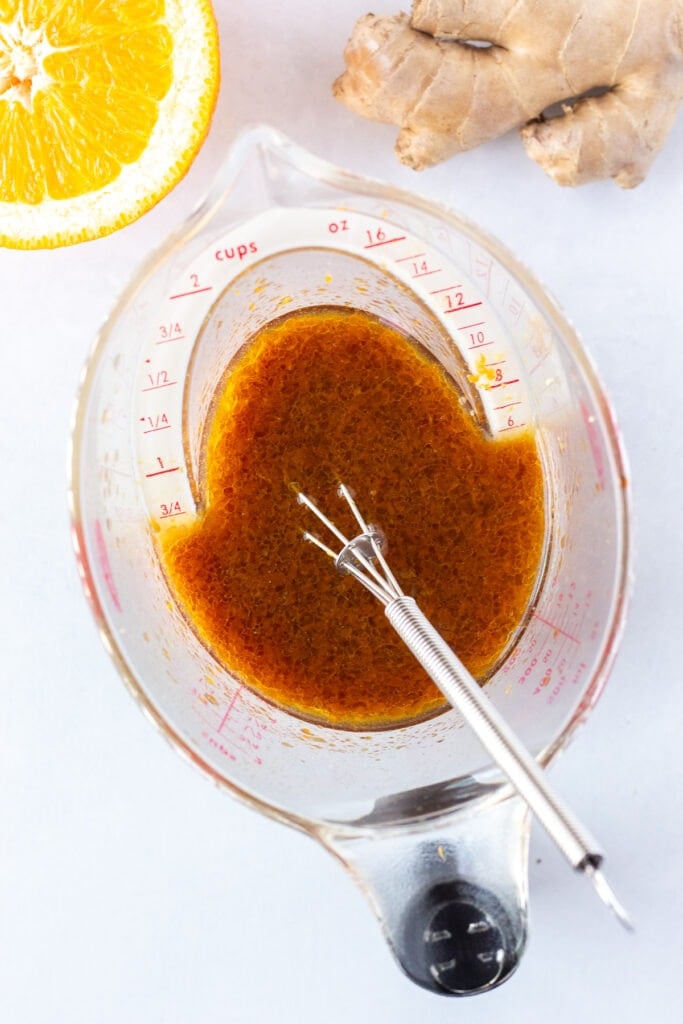
Use the marinade immediately, or store it in an airtight container in the fridge for up to 1 week.
This recipe makes about 7 ounces of marinade, which is enough for between 1.5 and 2 pounds of meat.
WHAT MAKES A GOOD MARINADE?
All marinades should have the following 4 elements:
- fat to coat the meat,
- acid to help break down the protein fibers,
- salt to season the meat, and
- spices, herbs, or other flavors.
In this marinade, the oil is the fat, the vinegar and honey act as an acid (and if you use soy sauce it acts as an acid too), the soy or tamari is the salt, and the orange and ginger provide additional flavor.
Recommended marinating times
You’ll want a different marinating time for different types of proteins. Here are my recommendations.
- For shrimp: no longer than 20 minutes. Seriously. Otherwise the acid in the orange juice will start to break down the shrimp and it will turn mushy.
- For chicken: 1 to 2 hours for boneless cuts of chicken, 2 hours for bone-in cuts.
- For pork: 1 hour for thinner or smaller cuts of pork (like thin-cut chops or tenderloin), and 2 hours for thicker cuts (like boneless pork chops).
Cooking with this orange ginger marinade
You can either grill, stir fry, or bake proteins with this marinade. The cooking time and temperature is going to depend on the cut of meat you’re cooking.
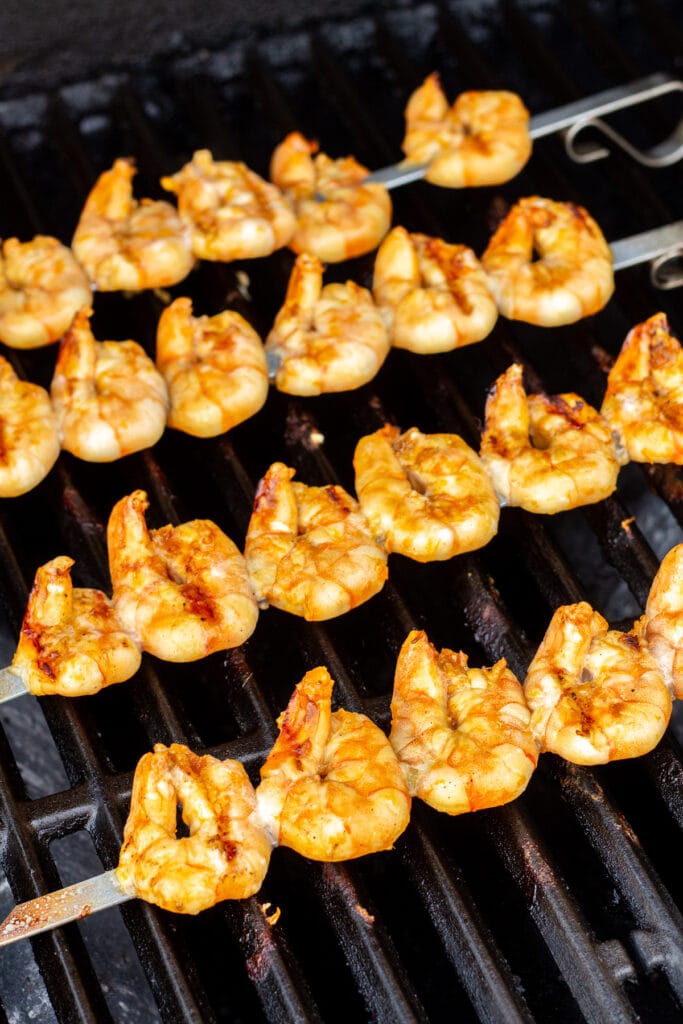
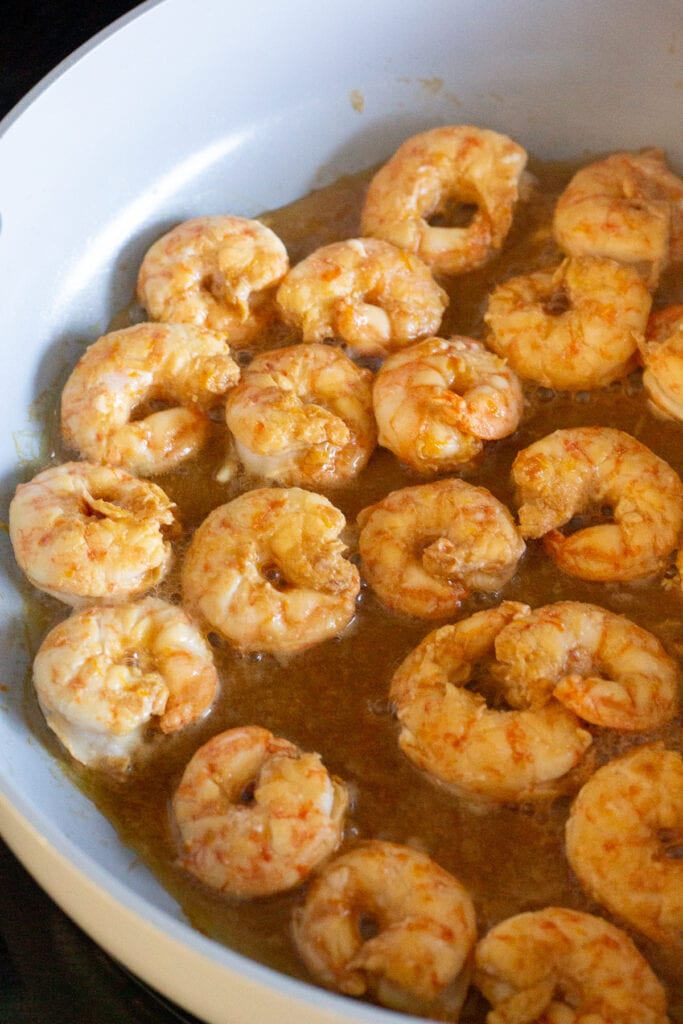
In all cases, you want to cook until the meat reaches the right internal temperature. I’ve listed them out below, but be sure and check out this guide on internal temperatures for meat – it’s written for grilling but is applicable for all cooking methods.
- Chicken: cook to 165 degrees F
- Pork: cook to 165 degrees F
- Shrimp: cook to 145 degrees F (or until opaque all the way through)
If you make this orange marinade for chicken, shrimp, & pork, then don’t forget to leave a star rating and let me know how it went in the comments below!
YOU can also follow me on FACEBOOK, INSTAGRAM, & PINTEREST to see more goot to eat, gluten free food on and off the grill.
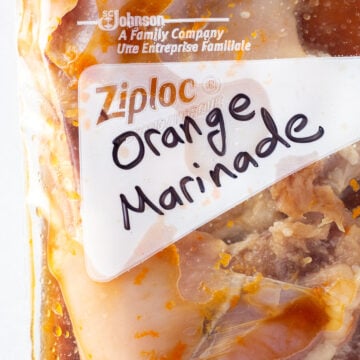
Orange Juice Marinade for Chicken, Pork, & Shrimp
Equipment
- A large liquid measuring cup
Ingredients
- Juice and zest of 1 orange about 2-3 oz of juice
- 1 tsp grated fresh ginger from a 1x1x0.5 inch piece
- 2 oz soy sauce or Tamari or gluten-free soy sauce
- 1 tbsp rice vinegar
- 2 tbsp honey
- 1 tbsp mild oil I use avocado oil
Instructions
- Take out a large measuring cup and measure out the soy sauce into it. Pour the soy sauce into another container and set aside (this is done so if the cup tips over when you’re zesting the orange the soy sauce doesn’t spill out).
- Next, zest the orange. Take out a microplane or other zester. If using a microplane, set it on top of the measuring cup. Zest the orange by rubbing it against the microplane in short swipes, scraping just the vibrant orange skin off into the cup and not the lighter pith underneath. You may need to wipe the zest off the bottom of the microplane with your finger to get it all off.
- Once the zest is off, use a sharp knife and cutting board to cut the orange in half or in quarters, depending on how big your juicer is. Juice the orange into the same measuring cup as the zest.
- If you’re not using ginger paste, you’ll also need to use the microplane to grate the ginger into the measuring cup as well. Do this by first cutting off the skin then firmly pressing the piece of ginger onto the microplane and running it back and forth to grate it. At the end you’ll be left with a small, stringy piece of ginger which you can just throw away.
- Pour the soy sauce back into the cup, then use measuring spoons to measure out the honey, oil, and rice vinegar and add them to the measuring cup as well. Use a small whisk or other utensil to stir everything together, making sure to scrape the bottom as the honey will want to stick there. And that’s it!
Notes
- The marinade can be stored in an airtight container in the fridge for at least one week.
- This recipe makes about 7 ounces of marinade, which is enough for between 1.5 and 2 pounds of meat.
- This marinade works well for grilling, stir frying, or baking.


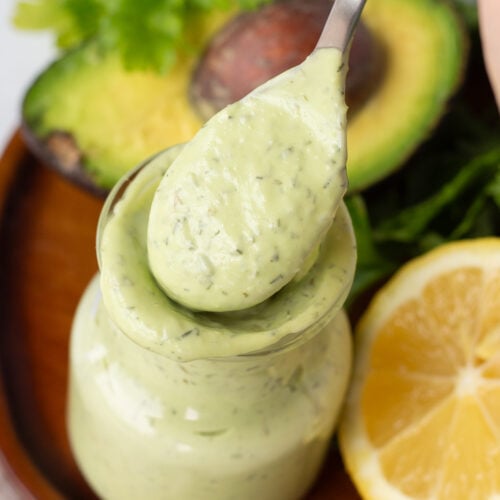
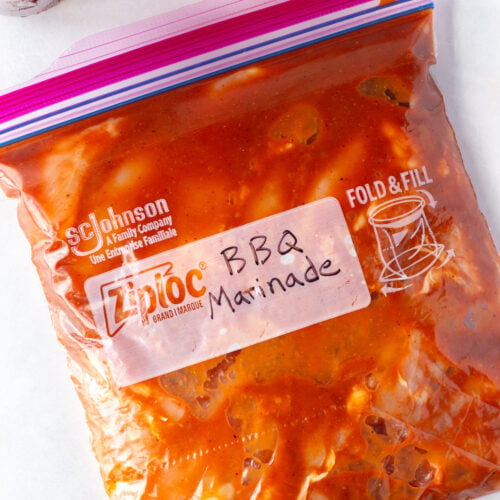
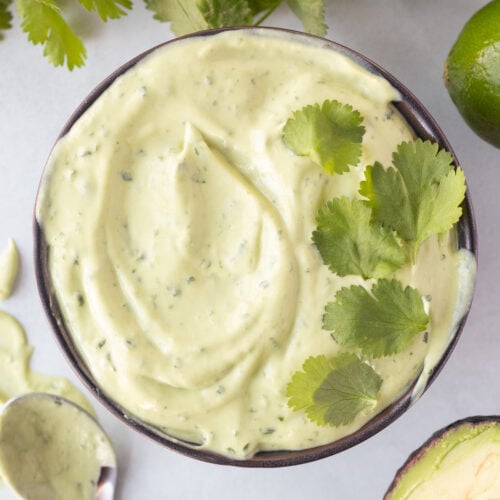
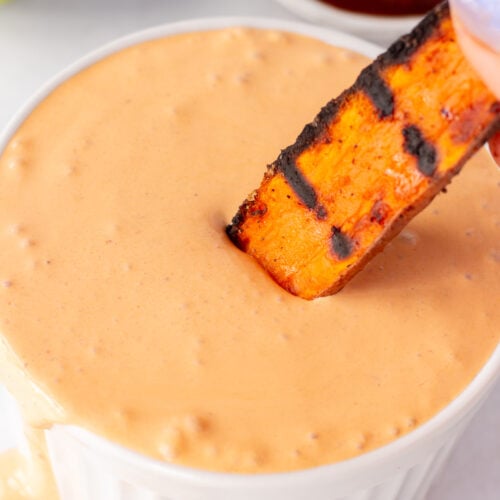
Leave a comment